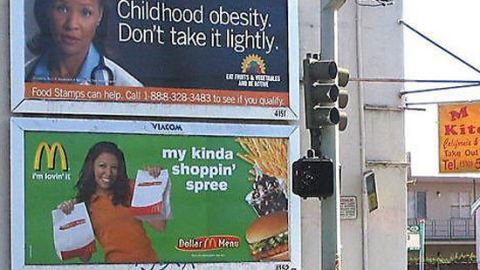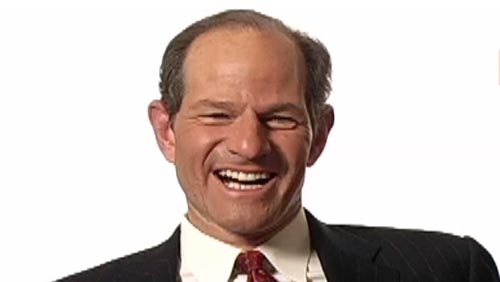Doubling Down on Diabetes (and the Myth of Free Choice)

Why use boring old bread to make your sandwich, when instead you can plop your bacon, cheese and sauce between two slices of deep-fried meat? It sounds like a sitcom joke (it was a sitcom joke, actually) but next week it becomes real, according to KFC. The chain’s “Double Down” sandwich consists of two “slices” of fried chicken enclosing bacon and cheese and sauce. Even the (totally unofficial) vegan version is a supersize shipment of fat. Yes, this is the same KFC that “proudly announced” in 2007 that it had removed the trans fats from its recipes. After all, KFC cares about your health!
The Double Down exemplifies the double role of business in this decade’s global upsurge of diabetes, heart diseases, strokes and other “lifestyle” diseases. Unless you’re an Olympic athlete, eating a lot of Double Downs makes you more likely to contract these chronic ailments, which are among the most expensive to treat (in part because they’re complex and often overlap, and in part because people with chronic illness need treatment for many years). As employers and taxpayers who help pay for the health-care system, corporations need people to get exercise, avoid tobacco, and eat healthily. But as merchants of pleasure and comfort, many of these same companies need people to chow down on the foods they sell.
One way to resolve this ideological contradiction is by appealing to the myth of free choice: If the Double Down sandwich is bad for you, well, you don’t have to eat it. And, according to the myth, deciding not to is as easy as deciding to indulge. The mantra of industry mouthpieces like this one is that people are free to make good choices about fats, sugars, tobacco and other products.
That myth of choice depends on another myth: that of “rational economic man.” That’s the assumption that people make their eating, drinking and smoking decisions by rationally evaluating all necessary information (provided—another assumption—by the free market). In showing that people don’t behave this way, work in behavioral economics and related fields has pulled the props out from under the ideology of free choice in free markets. In this paper, for example, Jennifer Harris and her collaborators report that kids, when shown a Disney cartoon that included typical snack-food commercials, ate 45 percent more Goldfish crackers than did kids who had watched the same show without food ads. That’s not because Goldfish has a great ad campaign, as none of the commercials mentioned that brand. Rather, it’s because seeing food portrayed in a commercial makes kids want to eat something.
Still, the tidal wave of marketing for Double Downs don’t affect everyone the same way. Some individuals will go out and eat a lot of these things; others will decide not to. So “no choice” would be as false a myth as “perfect choice.” People differ in their individual decisions; they just don’t differ for the reasons economists proclaimed until recently.
Those differences in “lifestyle” choices aren’t randomly distributed across society. They occur in reliable patterns, which suggests that there are laws that can predict people’s choices—laws that, once discovered, would be a better guide to people’s behavior than the old “rational chooser” model.
Which brings us to a controversy in the growing discipline of “social epidemiology”—the study of patterns in health-related behaviors. One of those patterns is an inverse relationship between social class and “healthy” lifestyle behavior. The higher you are in socioeconomic status, the more likely you are to watch your diet, exercise, avoid tobacco and keep up with routine medical exams. (One of the problems with “wellness” campaigns is that they are, like it or not, campaigns in which upper-middle-class people try to persuade less privileged folk to be more like them.)
The debate is about how much these “lifestyle” differences matter. Sir Michael Marmot, an epidemiologist at University College, London, argues that it doesn’t. His studies suggest the real cause of poorer health in lower-status people is lower status itself. Marmot and his collaborators tracked the long-term health of thousands of British civil servants (work known, from the name of the London street where ministries cluster, as the Whitehall studies). As the decades passed in Whitehall, it turned out that the lowest-level bureaucrats were four times as likely to die of a heart attack as the bosses at the top of the heap. Higher status meant lower risk of diabetes, depression and angina.
“Social conditions reflect the degree of autonomy and control individuals have and their opportunities for full social engagement,” he argues in The Status Syndrome. The less control you have over your life, the more stress (which is associated physiologically with bad cholesterol and psychologically with an attitude expressed by a woman Marmot quotes: “Why should I worry about smoking or obesity that might increase my disease risk in thirty years when I cannot see how to get through next week?”)
This is an influential and important argument, which makes sense in evolutionary terms (being low in the pecking order is bad for long-term health in many species). And it offers a way out of the absurd individuals-only perspective which proclaims that Joe the jobless teen-ager guy and Jack the comfortable suburbanite are equally free to make sane choices about fast food.
However, this claim for the importance of status to health just got challenged, with data also drawn from Whitehall. In this paper in last month’s Journal of the American Medical Association, a team of French and British researchers claim the older studies are flawed, because only one snapshot in time was used to represent each patient’s smoking, alcohol consumption, diet, and physical activity. Silvia Stringhini and her co-authors added each patient’s change over time to the analysis. Doing that, they say, shows that most of the connection between status and health can be explained by the differences in behavior, not differences in status itself. In other words, they’re arguing that it’s those Double Downs, not feeling down, that counts.
Whoever is right here—whether low status causes heart failure directly, or indirectly by causing people to smoke and eat at KFC a lot—the larger lesson of “social epidemiology” stands: The only way to make individuals healthier is to make society healthier. As the World Health Organization’s Commission on the Social Determinants of Health (Michael Marmot, chair) puts it: “It’s the context of people’s lives that determines their health. So blaming individuals for poor health or crediting them for good health is inappropriate.”





